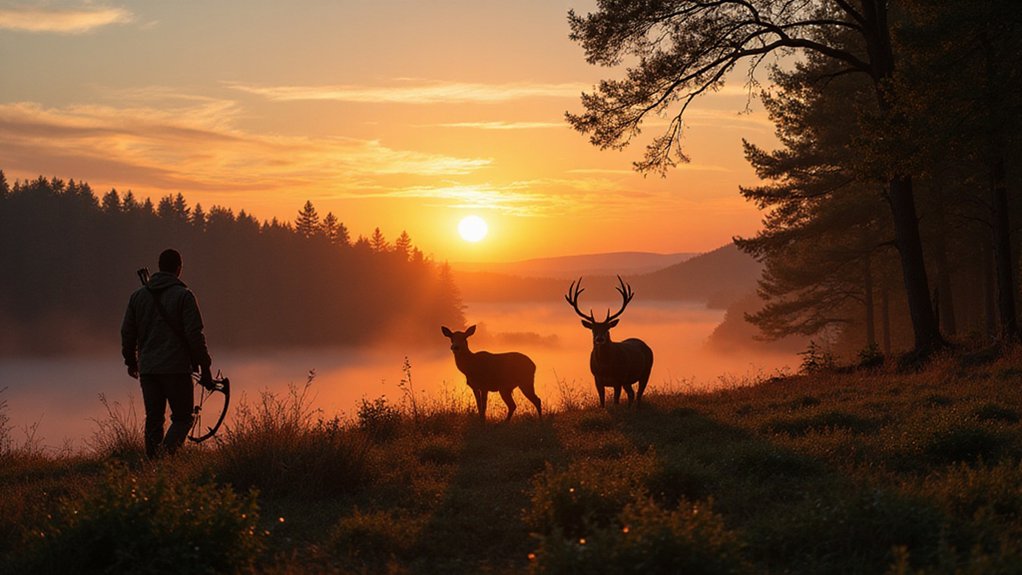As you consider the future of hunting, think about how younger generations are reshaping this age-old practice. They’re emphasizing sustainability and ethics, pushing for a more responsible way to engage with nature. Technology is also playing a significant role in this evolution. But what does this mean for traditional hunting practices and the communities that support them? The answers might surprise you as we explore this shifting landscape.
What is the Future of Hunting and Its Trends?
As you consider the future of hunting, it’s clear that several key trends are shaping how enthusiasts engage with this age-old practice.
Increased focus on conservation is driving hunters to adopt sustainable methods, enhancing their connection to nature.
Community-driven initiatives are promoting inclusivity, making hunting more accessible for diverse populations.
Additionally, younger generations are prioritizing ethical hunting, which emphasizes respect for wildlife and ecosystems.
As regulations evolve, hunters are becoming more involved in advocacy efforts to protect their rights.
These trends signal a shift towards a more responsible, engaged, and community-oriented approach to hunting in the years ahead.
How Are Technology and Innovation Shaping the Future of Hunting?
While you might think of hunting as a tradition steeped in history, technology and innovation are rapidly transforming the landscape. You can now use drones for scouting, advanced optics for precision, and mobile apps for tracking weather and wildlife patterns.
Smart gear, like GPS-enabled collars for dogs, enhances your experience and increases success rates. Virtual reality simulators offer training without stepping into the field.
Additionally, online platforms connect you with fellow hunters, sharing tips and experiences. As these advancements continue, they’ll not only enhance your skills but also reshape the way you approach hunting, making it more efficient and enjoyable.
Why Conservation Efforts are Crucial for the Future of Hunting?
Conservation efforts play an essential role in guaranteeing the sustainability of hunting for future generations.
By protecting habitats and maintaining wildlife populations, you help create a balanced ecosystem that supports diverse species. Healthy populations mean better hunting experiences, allowing you to connect with nature while enjoying the sport you love.
Additionally, conservation initiatives often involve local communities, fostering a sense of shared responsibility and stewardship. When you invest in conservation, you’re not just securing your own hunting future; you’re also preserving the traditions and values that make hunting meaningful.
Together, we can guarantee that hunting remains a vibrant part of our culture.
What Role Does Ethics Play in the Future of Hunting?
Ethics plays a pivotal role in shaping the future of hunting, influencing how hunters approach their sport and interact with wildlife.
As you navigate this evolving landscape, it’s crucial to prioritize responsible practices that respect animal welfare and ecosystems. Ethical hunters advocate for sustainable methods, ensuring they leave minimal impact on the environment.
How Can Hunters Adapt to Changing Regulations and Environments?
How can you effectively navigate the shifting landscape of hunting regulations and environmental changes?
Start by staying informed. Regularly check local wildlife agency websites and subscribe to newsletters for updates.
Engage with your local hunting community, sharing knowledge and experiences.
Embrace flexible hunting strategies; adapt your methods based on seasonal shifts and wildlife patterns.
Practice ethical hunting by respecting regulations and fostering sustainable practices.
Consider taking advanced training courses to better understand wildlife management.
Finally, be open to new technologies and tools that enhance your hunting experience while keeping you compliant with evolving laws.
Adaptability is key to successful hunting in changing times.
What Will Future Hunting Gear and Equipment Look Like?
As technology continues to evolve, future hunting gear and equipment will likely become more sophisticated and user-friendly.
Imagine using lightweight, durable materials that adapt to various environments, ensuring maximum comfort and efficiency. Smart optics will provide real-time data on distance, wind conditions, and animal behavior, enhancing your accuracy.
Wearable devices could monitor your essential signs, helping you stay safe during long treks. Drones might assist in scouting, offering aerial views of hard-to-reach areas.
With advancements in camouflage technology, your gear could blend seamlessly into any landscape, making you virtually invisible to wildlife. The future of hunting gear is both exciting and transformative.
How Are Communities Coming Together to Support the Future of Hunting?
While many might think of hunting as an individual pursuit, communities are increasingly banding together to secure its future. Local hunting clubs and organizations are hosting workshops, teaching skills, and sharing knowledge to foster a new generation of hunters.
You might find yourself participating in community hunts that emphasize conservation and sustainable practices. Social media groups are also connecting hunters, allowing you to exchange tips and experiences.
Additionally, towns are organizing events that celebrate hunting traditions, creating a sense of belonging. By working together, these communities safeguard that hunting remains a valued activity for years to come, preserving it for future generations.
What Impact Will Climate Change Have on the Future of Hunting?
With climate change altering habitats and wildlife patterns, hunters face unprecedented challenges in the coming years.
You’ll notice shifts in animal migrations and breeding cycles, making it harder to predict their locations. As temperatures rise, some species may adapt or even vanish from your hunting grounds.
Water sources could dwindle, pushing game into new territories, and altering their behaviors. Additionally, extreme weather events can disrupt seasons and accessibility.
To stay successful, you’ll need to adapt your strategies, invest in new gear, and stay informed about the changing ecosystem. Being proactive will guarantee you remain connected to nature and the thrill of hunting.
